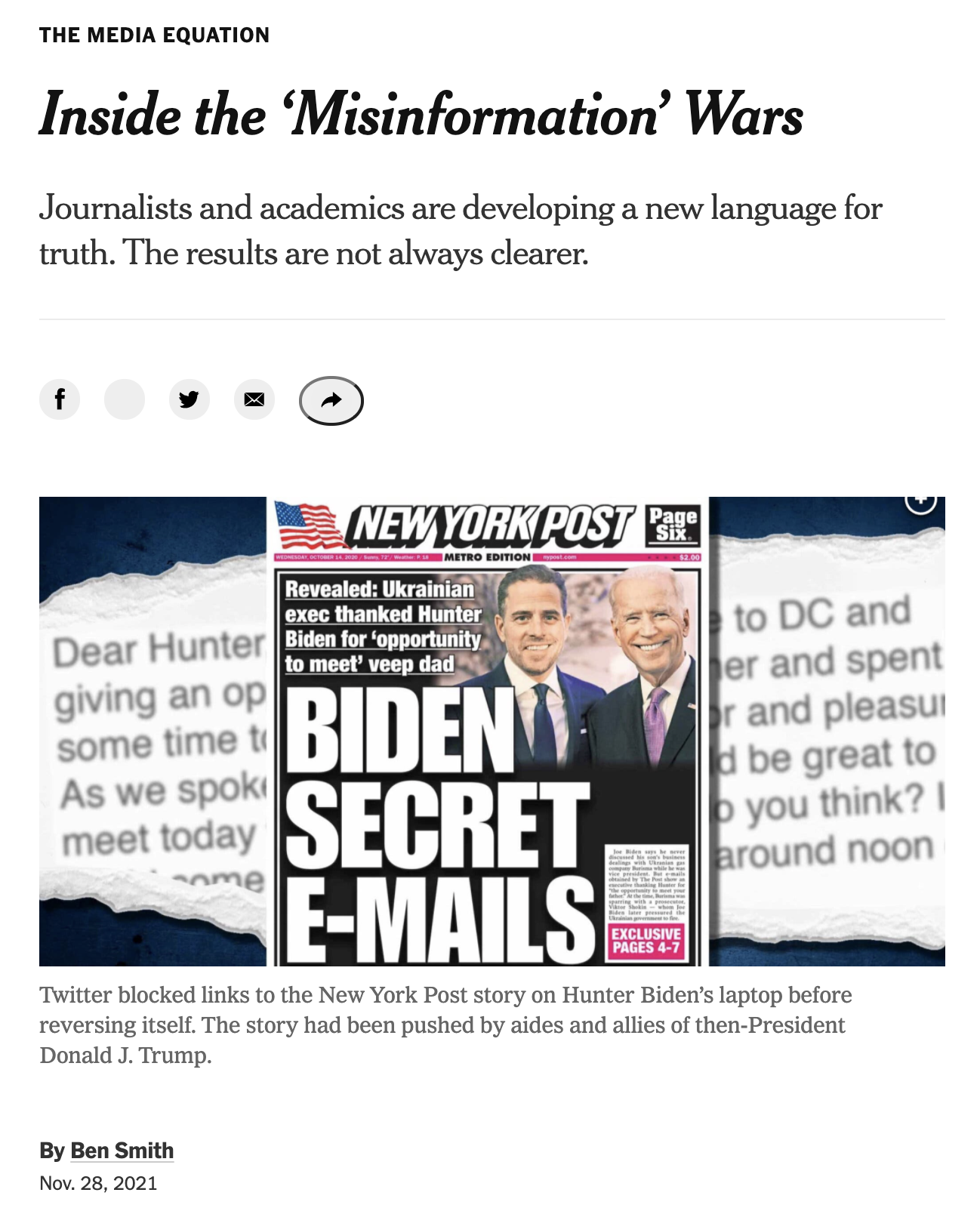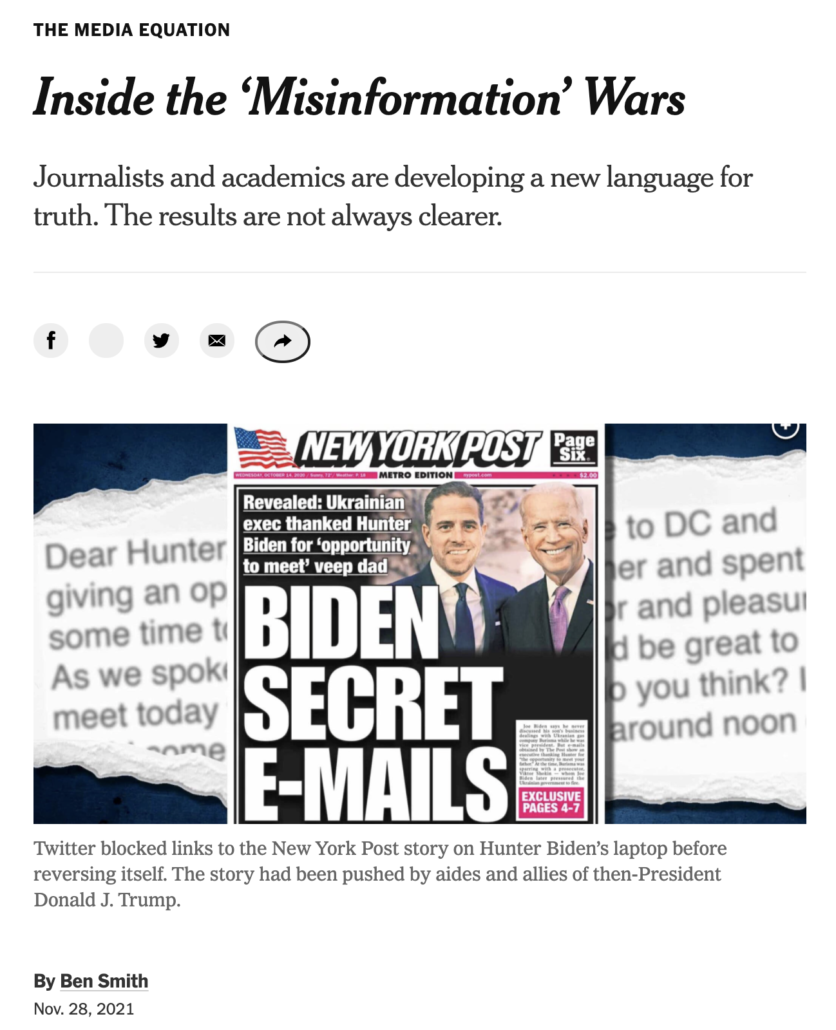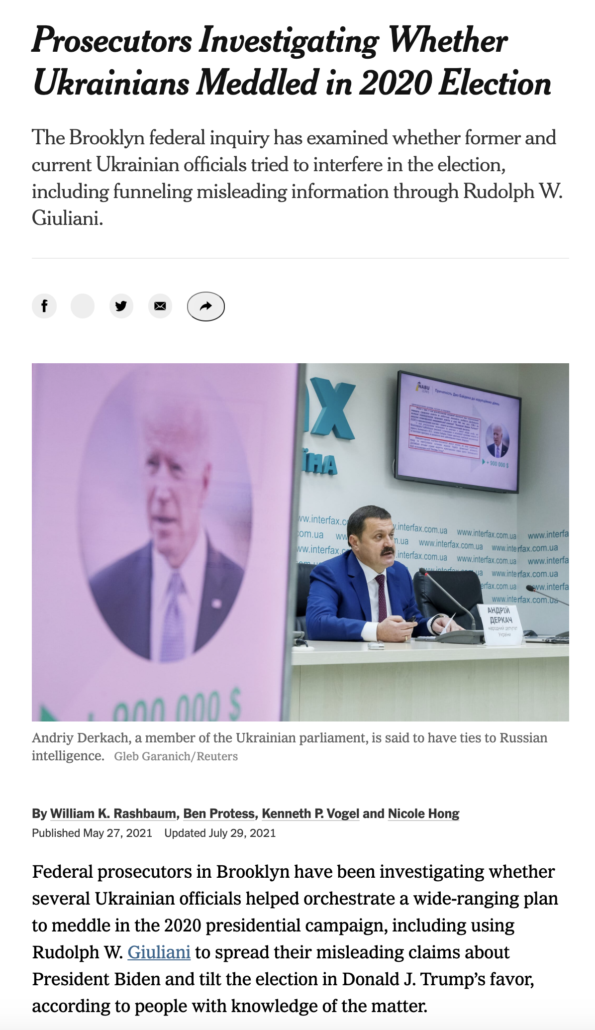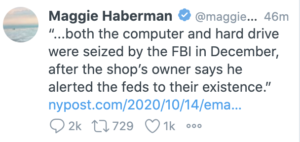Ben Smith Still Doesn’t Understand He Peddled Likely Russian Disinformation
I’m not sure whether it was just chance or whether Ben Smith knew in advance that BuzzFeed would announce the closure of its news division on the same day that he posted an account of publishing the Steele dossier. His account doesn’t explain whether the cost of defending against serial Russian lawfare for publishing the dossier made it harder, in the aftermath, to pay journalists’ salaries, but it’s a question that deserves an answer.
But Ben’s account — which focuses, as most of Ben’s writing does, on insider news media stuff — makes two grave errors.
The first is that — even though he quotes Pete Strzok describing how the dossier framed the Russian investigation, thereby inoculating Trump against accountability for the very real scandalous behavior he had with Russia — Ben falsely suggests that the dossier was the genesis of the public concern about Trump’s ties to Russia.
We had embedded it as a PDF, which meant that it could travel context-free, without our article’s careful disclaimers, and that’s exactly what happened. I watched uneasily as educated Democrats who abhorred Trump supporters’ crude rants about child sex rings in Washington pizza joints were led by the dossier into similar patterns of thought. They read screenshots of Steele’s report; they connected the dots. They retweeted threads about how the plane of a Russian oligarch—previously unknown to them, now sinister—had made a mysterious stop in North Carolina.
[snip]
It had blown wide open a Russia investigation and forced voters to ask just why Trump seemed so friendly with Vladimir Putin.
[snip]
An FBI agent who investigated Trump, Peter Strzok, later said the dossier “framed the debate” in a way that ultimately helped Trump: “Here’s what’s alleged to have happened, and if it happened, boy, it’s horrible—we’ve got a traitor in the White House. But if it isn’t true, well, then everything is fine.”
The notion that Democrats and national security hawks weren’t concerned about Trump’s Russian ties until January 10, 2017 is ludicrous. The effort to understand Trump’s Russian ties went into high gear on July 27, 2016, when he encouraged Russia to attack his opponent and floated recognizing the annexation of Crimea. It never stopped thereafter.
And, as I had to explain patiently to Columbia Journalism Review, even the intense press reporting on Trump’s real ties to Russia started before January 10, because the WaPo was already onto Mike Flynn’s lies about his outreach to Sergey Kislyak by then. Strzok’s point, I think, is that publishing the dossier made it easier for Trump to get away with attempting to undermine sanctions on Russia and all the rest because at least undermining sanctions wasn’t a pee tape.
No one needed the dossier to heighten concerns about Trump’s fondness for Russia. That’s a myth created by Russiagate [sic] peddlers trying to distract from the very real scandal of Trump’s ties to Russia.
Ben’s other silence, though, is irresponsible.
As I have noted, as the Carter Page IG Report makes clear, and as Republicans in Congress have come to agree, there’s abundant reason to believe that Russians started feeding Igor Danchenko with disinformation from the start. Lawyers for Oleg Deripaska were likely the client for a Steele collection effort targeting Paul Manafort in March 2016. According to declassified footnotes in the IG Report, Deripaska likely learned of the dossier project before the second report. And he demonstrably played a double game throughout 2016, getting Steele to feed Bruce Ohr damaging claims about Manafort at the same time as his aide, Konstantin Kilimnik, was exploiting Manafort’s legal and financial vulnerability to get information on the Trump campaign and a commitment to help carve up Ukraine.
This dynamic is utterly central to understanding the dossier. Someone who played a central role in the 2016 Russian operation knew about the dossier project, and had means to know of Danchenko’s collection network, almost from the start. And that makes it likely that at least some of the content of the dossier was tailored to be wrong in ways that benefitted the Russian operation.
Ben’s silence about the likelihood that he unwittingly peddled Russian disinformation is all the more embarrassing given how his post transitions directly from suggesting that John Durham had “poked holes in Steele’s sourcing” to noting that there was something that Trump actually was lying to cover up: the impossibly lucrative Trump Tower deal in Moscow.
Simpson then told Ken something he didn’t know: Steele had been working the case of the president-elect, Donald Trump, and he’d assembled evidence that Trump had close ties to the Kremlin—including claims that Michael Cohen, one of his lawyers, had held secret meetings with Russian officials in Prague, and that the Kremlin had a lurid video of Trump cavorting with prostitutes in the Ritz-Carlton Moscow that would come to be known as the “pee tape.”
[snip]
But although the biggest-picture claim—that the Russian government had worked to help Trump—was clearly true, the release of Special Counsel Robert Mueller’s investigation in April 2019 did not support Steele’s report. Indeed, it knocked down crucial elements of the dossier, including Cohen’s supposed visit to Prague. Internet sleuths—followed by a federal prosecutor—had poked holes in Steele’s sourcing, suggesting that he’d overstated the quality of his information.
And there had always been a more mundane version of the Trump-Russia story. Trump was the sort of destabilizing right-wing figure that Putin had covertly supported across Europe. Trump’s value to Putin was related not to a secret deal, but to the overt damage he could do to America. And Trump, BuzzFeed News’s Anthony Cormier and Jason Leopold discovered, had a more mundane interest in Russia as well: He had drawn up plans to build the biggest apartment building in Europe on the banks of the Moskva River. The Trump Organization planned to offer the $50 million penthouse to Putin as a sweetener.
That real-estate project wasn’t mentioned anywhere in the dossier. Yet it seemed to explain the same pattern of behavior, without the lurid sexual allegations or hints of devious espionage.
The man responsible for publishing both the Steele dossier and the best reporting on the Trump Tower Moscow deal seems not to understand that false claims about Michael Cohen in the dossier were likely there because of the Trump Tower deal.
Ben invokes what Durham’s failed prosecution revealed about (what Ben mistakenly claims to be) Danchenko’s sourcing, without laying out the import of Danchenko’s ties to Charles Dolan: Dolan gave the source of the Cohen claims in the dossier, Olga Galkina, direct access to Dmitri Peskov, the one man in Russia with proof that when Trump falsely claimed in July 2016 that he wasn’t pursuing real estate deals in Russia, he was lying. Even Durham implied this was the import of Dolan’s relationship with Galkina! Dolan was important because he put Galkina, who was sending dirt on Trump to her childhood buddy, Igor Danchenko, in close touch with Peskov.
The source of the claims that Cohen had secret communications with the Kremlin in the dossier had direct ties to the one guy in Russia, Peskov, who provably knew that Cohen really did have secret communications directly with the Kremlin that he and Trump were lying to hide.
Once Trump publicly lied about chasing real estate deals in Russia in July 2016, it made the notes Peskov’s aide took, showing that Cohen had agreed to work with sanctioned banks and a retired GRU officer as fixer in order to chase one such deal, far more valuable to Russia, particularly after it became clear in the US that the GRU was behind the hack of Hillary. So it is likely not random at all that someone with direct access to Peskov told Danchenko that Cohen — who was lying to hide his real direct contact with the Kremlin during the election — had other, more damning direct contact with the Kremlin. It raised the stakes of Trump’s and Cohen’s lies. It raised the value of Russia’s silence about the earlier conversation with Peskov. To the extent that everyone kept their shared secret — and they did for the entire first year of the Trump Administration — it provided cover for the lies that Cohen would tell to Congress.
From the start, the FBI had warnings that the Cohen in Prague story was disinformation. And it just so happens that the story, which came from someone with ties to Peskov, repeated a true fact that Peskov knew: that Cohen really did have secret communications with the Kremlin, communications that had already compromised Trump and Cohen with Russia before the hacking even started. If the Cohen in Prague story was disinformation (and, again, FBI got warnings it was the day after Ben published the dossier), it was disinformation that made that earlier compromise more powerful.
And Ben Smith, who played a key role in disseminating that likely disinformation, appears to not even understand that, much less want to reflect on his role in being an unwitting mule for Russian disinformation.





